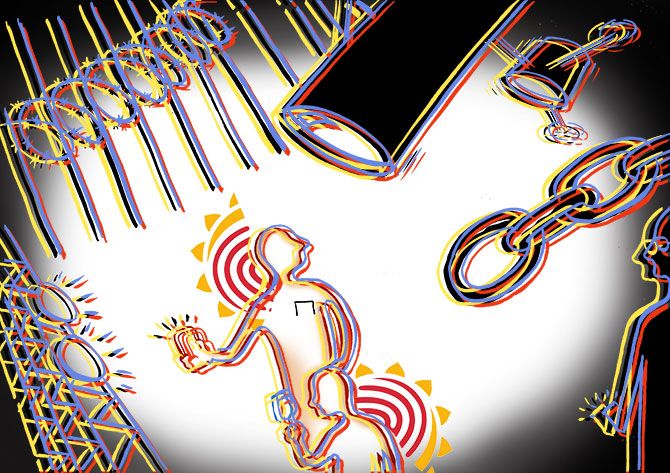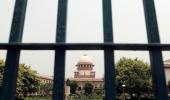'Before the elections, fake news can create law and order hassles and that is the reason they want social media firms to follow the amended IT Act.'
Karan Choudhury reports.

Days after enabling 10 security agencies to intercept, monitor, and decrypt information from computers across the country, the government is moving to rein in social media platforms.
From providing the source of any information deemed a threat to national security, removing objectionable content within 24 hours to having permanent offices in India if the user base is above 5 million, the government is planning amendments to the Information Technology Act and has sought public feedback by January 15 before taking a final call.
If the plan materialises, it would be mandatory for social media giants such as Facebook, WhatsApp and Twitter to trace the originator of information if needed. The platforms would also need to remove such content within 24 hours of being notified.
On their part, social media firms said they would follow all regulations but privacy of its users would be of utmost concern.
"These are preliminary steps. We have to see what rules and regulations are finally formulated," said a source close to Faceboook.
According to sources in the IT ministry, the government plans to bring in changes in the IT Act before the 2019 polls.
"The government wants to plug the root causes of fake news that have led to incidents like rioting and lynching. Before the elections, fake news can create law and order hassles and that is the reason they want social media firms to follow the amended IT Act," said a senior official in the ministry.
IT ministry officials held a meeting last week with senior executives of Google, Facebook, WhatsApp, Twitter and other companies to discuss the proposed changes.
A few months ago the government had asked chat messaging platforms such as WhatsApp to provide details of the providers of fake news. The company had then said there were privacy issues and such details can't be shared.
Since then, however, WhatsApp has taken a middle path and paid heed to the government's other demands, including having a local team, an India head as well as having an office in the country.
According to the draft, which was uploaded on the IT ministry's Web site on Monday, automated tools would have to be deployed by social media platforms to identify and disable 'unlawful content'.
Users would be asked to guard against hosting or sharing information that violates any law, deceives or misleads receivers about the origin of messages that are grossly offensive or menacing in nature, or those which threaten national security.
These Internet companies will also have to preserve relevant records for 180 days for investigation purposes or longer periods, if required.
It has also been proposed that the platforms should inform users at least once a month that if rules are violated, access and user rights would be terminated.
The Congress said if these amendments were cleared, there would be a tremendous expansion in the power of the 'big brother' government on ordinary citizens, 'reminiscent of eerie dictatorships'.
When the government allowed the 10 agencies to snoop on computers across India, the Congress accusing the Centre of trying to create a "surveillance State'.
Experts also warned that amendments, which would allow traceability of 'unlawful content', invade personal privacy and free speech.
Cyberlaw expert Pavan Duggal said some of the changes planned are akin to India's own anti-encryption law. The proposed changes in rules will place social media platforms -- even those like WhatsApp which promise users privacy and encryption -- firmly under the government lens.
Nikhil Pahwa, a digital rights activist, said the changes mooted to the IT Act are "harmful" for democracy and free speech.
The requirement for platforms to proactively take down content will lead to censorship of speech, Pahwa said.
"The amendments are also contrary to the spirit of section 79 of the IT Act, which was created to provide safe harbour to intermediaries, which are enablers of speech and commerce. Also, any government order for traceability must be backed by a judicial order, else it will enable unrestricted surveillance of citizens," he said.
Govt order giving agencies vast snooping powers challenged in Supreme Court
The petition says the government's order could be used to 'fix innocent citizens of India'.
Aashish Aryan reports.
The central government's December 21 notification giving 10 agencies wide-ranging powers to decrypt information stored on any computer in the country in the interest of national security has been challenged in the Supreme Court.
The matter, however, has been denied an urgent hearing and will be listed according to the usual roster when the apex court reopens on January 2.
The said notification has been challenged by advocate M L Sharma who said in his petition that the said notification should be set aside as it violated Section 21 of the Constitution and ran contra to the nine-judge Constitution Bench which had declared Right to Privacy as a Fundamental Right.
The petition also says the government's new order could be used to 'fix innocent citizens of India' and the incumbent government could use it for their political benefits since the general election is approaching.
On December 21, the ministry of home affairs's cyber and information security division had allowed agencies such as the Intelligence Bureau, Enforcement Directorate, Central Bureau of Investigation and the commissioner of police, Delhi, among others, powers to intercept, monitor and decrypt any information generated, transmitted, received or stored in 'any computer'.
Relying upon Section 69 (1) of the Information Technology Act, the government had also said that any subscriber or service provider in charge of any computer resource is bound to extend all facilities and technical assistance to these agencies, failing which they would have to face a seven-year jail term and be fined.
Legal experts have, however, said the powers given to agencies under Section 69 of the IT Act need to be looked at afresh in view of the top court declaring the Right to Privacy as a fundamental right.
"It runs contra to the Supreme Court judgment in Puttaswamy vs Union of India. The apex court will have to look afresh at Section 69 and the wide-ranging powers under it. The chances of such powers being abused are very high," cyber law expert Pavan Duggal said.
In 2015, the top court had, while striking down Section 66 A of the IT Act, upheld the government's powers under Section 69 of the same Act, but with reasonable restrictions.
Later in 2018, a nine-judge Constitution Bench had, while hearing the Puttaswamy vs Union of India case, declared the Right to Privacy as a fundamental right.
The petition also seeks that the top court should prohibit the government from initiating any criminal cases or investigation against individuals under Section 66 and 67 of the IT Act of 2000.
Section 66 of the IT Act recommends fine of up to Rs 500,000 and jail term of up to three years for hacking, receiving a stolen computer, using the digital identity of others, cheating, cyber terrorism, and denying computer access to any authorised personnel.
Section 67, on the other hand, recommends a stricter jail term of up to seven years and fine of up to Rs 1 million for crimes such as publishing images containing a sexually explicit act or conduct, child pornography, and failure on part of service providers to maintain records.












 © 2025
© 2025